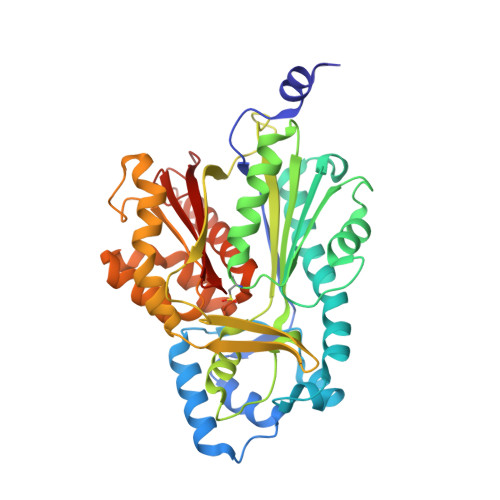Expanding the biosynthetic repertoire of plant type III polyketide synthases by altering starter molecule specificity.
Jez, J.M., Bowman, M.E., Noel, J.P.(2002) Proc Natl Acad Sci U S A 99: 5319-5324
- PubMed: 11959984
- DOI: https://doi.org/10.1073/pnas.082590499
- Primary Citation of Related Structures:
1JWX - PubMed Abstract:
Type III polyketide synthases (PKS) generate an array of natural products by condensing multiple acetyl units derived from malonyl-CoA to thioester-linked starter molecules covalently bound in the PKS active site. One strategy adopted by Nature for increasing the functional diversity of these biosynthetic enzymes involves modifying polyketide assembly by altering the preference for starter molecules. Chalcone synthase (CHS) is a ubiquitous plant PKS and the first type III PKS described functionally and structurally. Guided by the three-dimensional structure of CHS, Phe-215 and Phe-265, which are situated at the active site entrance, were targeted for site-directed mutagenesis to diversify CHS activity. The resulting mutants were screened against a panel of aliphatic and aromatic CoA-linked starter molecules to evaluate the degree of starter molecule specificity in CHS. Although wild-type CHS accepts a number of natural CoA thioesters, it does not use N-methylanthraniloyl-CoA as a substrate. Substitution of Phe-215 by serine yields a CHS mutant that preferentially accepts this CoA-thioester substrate to generate a novel alkaloid, namely N-methylanthraniloyltriacetic acid lactone. These results demonstrate that a point mutation in CHS dramatically shifts the molecular selectivity of this enzyme. This structure-based approach to metabolic redesign represents an initial step toward tailoring the biosynthetic activity of plant type III PKS.
Organizational Affiliation:
Structural Biology Laboratory, The Salk Institute for Biological Studies, 10010 North Torrey Pines Road, La Jolla, CA 92037, USA.















